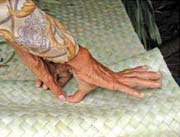International Workshop on Collective Action, Property Rights, and Conflict in Natural Resources Management
June 28th to July 1st, 2010, Siem Reap, Cambodia
CALL FOR ABSTRACTS
[download as pdf]
CAPRi is accepting abstracts on the topic of “Collective Action, Property Rights, and Conflict in Natural Resources Management” for presentation at an international research workshop to be held in Siem Reap, Cambodia, from June 28 to July 1, 2010.
The vast majority of victims in contemporary violent conflicts are civilians who depend directly on natural resources for their livelihoods. The post‐Cold War era is marked by such “subsistence wars,” mostly intra-state or cross-border conflicts occurring in the world’s poorer regions. Environmental destruction, wasteful resource use, and growing livelihood insecurity in these regions lead to greater competition over access to and ownership of natural resources, which acts as a driving or contributing factor to the conflict. A number of recent studies of this trend have attempted to identify the links between competition over natural resources and violent conflict.
Clearly, the progression from resource competition to violence is not inevitable. While much existing research has focused on how poverty, food insecurity, and scarcity of natural resources lead to violent conflict, the ways in which collective action to address these challenges may help to reduce the threat of conflict has received less attention. Numerous cases from Africa, Asia, and Latin America offer examples of conflict resolution or mitigation through efforts to organize for sustainable resource management, ranging from local to regional scales, and encompassing civil society, private, and state actors. These experiences, however, have not been assessed in comparative perspective. The workshop will address these links systematically, drawing on empirical cases from forests, water, land, fisheries, and other multiple resource systems.
The international workshop will focus on the positive ways in which collective action to resolve problems of allocation and access to renewable natural resources can help manage or prevent social conflict more generally.
Papers submitted should address either or both of the following themes:
Collective action, property rights, and conflict management.
What are the defining characteristics of natural resource management institutions that contribute to resilience in the face of intense competition among resource uses and user groups? What is the role of collective action in creating and sustaining these institutions? In what ways do clarity, equity, or flexibility in property rights influence the likelihood of competition being resolved peacefully rather than violently?
Rebuilding after violent conflict: The role of natural resources management institutions in community building.
What is particular about the challenge of rebuilding institutions (including property rights systems) for natural resources management in the wake of violent conflict? What strategies have proven most successful and why? In what ways does the work of investing in collective action to resolve problems of resource allocation and access reinforce more general efforts at societal reintegration?
Answers to these questions can help improve the design of policies and strategies for development interventions in conflict-affected environments, and identify ways to encourage improvements in natural resources management that reinforce cooperation and avert deepening cycles of conflict. The purpose of this workshop is to consolidate and synthesize experience on best practices for policy and institutional change, to communicate these lessons internationally, and to initiate a network of researchers and practitioners with an ongoing commitment to share experience and build capacity in this domain.
Abstract submission
Abstracts of proposed papers must be received by January 15, 2010. The abstract (150 to 400 words) should specify the focus of analysis, the empirical evidence to be presented, methodological approach, key conclusions, and implications for development policy, strategy, or institutional change processes.
Abstracts will be selected based on the following criteria:
Research focus. Clearly addresses one or both of the themes outlined above, persuasively stated.
Lessons. Promising lessons for development policy, strategy, or institutional change.
Empirical evidence. Strong basis of experience or data to underpin the analysis.
Methodological innovation. Results from qualitative, quantitative methods and trans-disciplinary research approaches are encouraged, with preference for innovative methods that can be replicated or adapted and developed to cover different conditions.
Diversity of regions and resource systems. The workshop organizers are seeking cases from Africa, Asia, and Latin America, and encourage both case study and multi-country comparative analyses.
Clarity. The abstract should effectively present the main elements of the paper as concise, coherent statement.
Abstracts must be received no later than January 15, 2010. Full papers (6000 to 8000 words) must be submitted by April 15, 2010. Please send abstracts to Eric Haglund at e.haglund@cgiar.org. Please also contact Eric with any questions or to request further information regarding the workshop.
Workshop arrangements
The workshop will be held in Siem Reap, Cambodia, from June 28 to July 1, 2010, and will include field visits to nearby sites where local partners have engaged in efforts at community-based management and other institutional and legal reforms addressing conflicts over forests, fisheries, land, and water resources. Participants will have the option of a pre-workshop side trip to the historic Angkor Wat temple complex.
CAPRI funds are available to cover travel costs for CGIAR researchers or collaborators selected to present papers at the workshop. Limited funds may also be available to fund the travel of selected non-CGIAR presenters. Funding questions will be resolved on an individual basis.
The workshop is co-sponsored by the
Institute for Environmental Security , The Hague, and is made possible through program funding to CAPRi from the governments of Norway, Italy, and the World Bank.





